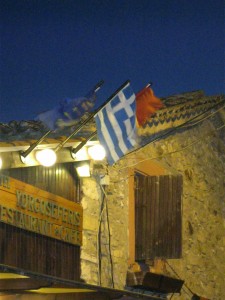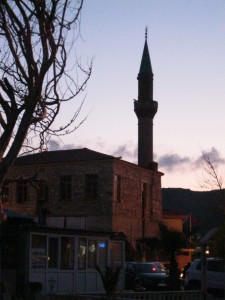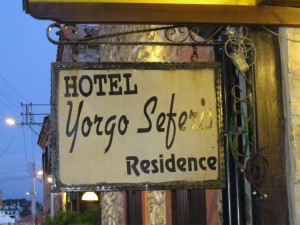This week’s post comes from Issue 9 contributor Adrianna Kalfopoulou. Adrianne has had her work appear in print and online journals including Hotel Amerika, World Literature Today, ROOM magazine, The Broome Street Review, Web Del Sol, VPR (Valparaiso Poetry Review) and Fogged Clarity. She lives and teaches in Athens Greece, and is on the faculty of the creative writing program at NYU. Her most recent book publication is Passion Maps (Red Hen Press), a poetry collection.
 I recently attended the EAAS (European Association of American Studies) conference in Izmir (or Smyrna, to the Greeks). I love these large gatherings of writers and thinkers which provide opportunities for sudden influxes of ideas and energy. The conference, hosted every two years in a European city, seemed atypical and enriched by the fact that we were in Izmir, not-quite Europe, or more precisely Anatolia that bridges East and West. This city and its bay was potent with resonance, as much for its location as for the conference theme — “The Health of the Nation” (March 30-April 2, 2012) at Ege University. Discussions of the health of the nation, or nations, in this particular part of the world took on particular immediacy. What constitutes “health,” ironically, found papers focused on the various symptoms of disease, and dis-ease, beginning with the opening keynote lecture given by Ayşe Lahur Kirtunç who spoke of Turkey today and focused on discourses of fear. From the media’s ongoing barrage of catastrophe documentation to dystopias of vulnerability and anxiety, Kirtunç’s talk was a brave mapping of the various threats to our physical and psychic wellbeing. While, in her words, “we have devised technologies to listen to chipmunks, dolphins, whales…we still have difficulty listening to each other.”
I recently attended the EAAS (European Association of American Studies) conference in Izmir (or Smyrna, to the Greeks). I love these large gatherings of writers and thinkers which provide opportunities for sudden influxes of ideas and energy. The conference, hosted every two years in a European city, seemed atypical and enriched by the fact that we were in Izmir, not-quite Europe, or more precisely Anatolia that bridges East and West. This city and its bay was potent with resonance, as much for its location as for the conference theme — “The Health of the Nation” (March 30-April 2, 2012) at Ege University. Discussions of the health of the nation, or nations, in this particular part of the world took on particular immediacy. What constitutes “health,” ironically, found papers focused on the various symptoms of disease, and dis-ease, beginning with the opening keynote lecture given by Ayşe Lahur Kirtunç who spoke of Turkey today and focused on discourses of fear. From the media’s ongoing barrage of catastrophe documentation to dystopias of vulnerability and anxiety, Kirtunç’s talk was a brave mapping of the various threats to our physical and psychic wellbeing. While, in her words, “we have devised technologies to listen to chipmunks, dolphins, whales…we still have difficulty listening to each other.”
 The effort to really listen to one another, as she described it, undermines the polarization of ideologies as much as the reductionist ways we view “Otherness;” it was a theme that wove through many of the conference presentations. “Fear is a powerful emotional tool which helps escalate conflict” Kirtunç said, it has us “falling into the trenches of prejudice….” Marc Priewe, from the University of Portsdam, Germany, gave a talk titled “Of Words and Wounds: Textualizing Illness in Colonial America” that spoke to a not dissimilar theme in his discussion of the smallpox pandemic in Puritan America. He spoke of Native American kinship networks that were destroyed by the introduction of the European disease and incited a cultural battle that ensued between “native healing rituals… and the Puritans’ providential views” which rationalized that the disease was God’s way showing the settlers that that God, in John Winthrop’s words, had “decreased them with our increase.” Though implicated in the disease-ridden Indians’ pandemic, the settlers reinforced the disparities and differences between themselves and the natives as a means of justifying their colonizing project. It seems so much easier to fall prey to what Kirtunç called “political demonology” – maybe there’s always been the need to “create a monster” as an excuse to slay it, but whose monster is it in the end – and how much more giddy and Odyssean to find in those others, or Others, not just the Cyclops, but Arete (Queen of Phaeacia in The Odyssey, and in Greek, “virtue”). Literature gives us the opportunity for the kinds of listening that makes for bonds rather than monsters. And Kirtunç’s talk ended on that note, with a tribute to contemporary Turkish artists, cartoonists, actors, and writers among whom was Turkey’s controversial Nobel Laureate Orphan Pamuk which she pointedly said she was not going to talk about because “I have a very old mother, and an idiosyncratic cat I need to take care of….”
The effort to really listen to one another, as she described it, undermines the polarization of ideologies as much as the reductionist ways we view “Otherness;” it was a theme that wove through many of the conference presentations. “Fear is a powerful emotional tool which helps escalate conflict” Kirtunç said, it has us “falling into the trenches of prejudice….” Marc Priewe, from the University of Portsdam, Germany, gave a talk titled “Of Words and Wounds: Textualizing Illness in Colonial America” that spoke to a not dissimilar theme in his discussion of the smallpox pandemic in Puritan America. He spoke of Native American kinship networks that were destroyed by the introduction of the European disease and incited a cultural battle that ensued between “native healing rituals… and the Puritans’ providential views” which rationalized that the disease was God’s way showing the settlers that that God, in John Winthrop’s words, had “decreased them with our increase.” Though implicated in the disease-ridden Indians’ pandemic, the settlers reinforced the disparities and differences between themselves and the natives as a means of justifying their colonizing project. It seems so much easier to fall prey to what Kirtunç called “political demonology” – maybe there’s always been the need to “create a monster” as an excuse to slay it, but whose monster is it in the end – and how much more giddy and Odyssean to find in those others, or Others, not just the Cyclops, but Arete (Queen of Phaeacia in The Odyssey, and in Greek, “virtue”). Literature gives us the opportunity for the kinds of listening that makes for bonds rather than monsters. And Kirtunç’s talk ended on that note, with a tribute to contemporary Turkish artists, cartoonists, actors, and writers among whom was Turkey’s controversial Nobel Laureate Orphan Pamuk which she pointedly said she was not going to talk about because “I have a very old mother, and an idiosyncratic cat I need to take care of….”
 I found myself, too, oddly careful of my spoken Greek, after all this was Smyrna, the town and population that burned in 1922 when Kemalist troops massacred the indigenous Greek population. It is a traumatic chapter in 20th century Greek history, one still referred to as the “Smyrna Catastrophe.” But the story like so much history is complicated. One of my daughter’s college roommates in the U.S. is from Turkey, and her parents insisted I visit them while I was visiting. On the last day of the conference they drove me to their coastal town outside the city. It was another surprise, as there in “Urla” was the Greek poet and Nobel Laureate George Seferis’ house. He was born there in 1900. There was a plaque and the Turkish and Greek flags above the entrance. In his book Mythistorema (“story” in Greek) the speaker addresses an angel, and in section 7 of the poem titled “South Wind,” he tells us:
I found myself, too, oddly careful of my spoken Greek, after all this was Smyrna, the town and population that burned in 1922 when Kemalist troops massacred the indigenous Greek population. It is a traumatic chapter in 20th century Greek history, one still referred to as the “Smyrna Catastrophe.” But the story like so much history is complicated. One of my daughter’s college roommates in the U.S. is from Turkey, and her parents insisted I visit them while I was visiting. On the last day of the conference they drove me to their coastal town outside the city. It was another surprise, as there in “Urla” was the Greek poet and Nobel Laureate George Seferis’ house. He was born there in 1900. There was a plaque and the Turkish and Greek flags above the entrance. In his book Mythistorema (“story” in Greek) the speaker addresses an angel, and in section 7 of the poem titled “South Wind,” he tells us:
After the bitter bread of exile,
at night if we remain in front of the white walls,
your voice approaches us like the hope of fire;
and again this wind hones
a razor against our nerves.
Each of us writes you the same thing
and each falls silent in the other’s presence,
watching, each of us, the same world separately
George Seferis, The Collected Poems (Princeton UP, 1967)
Translated by Edmund Keeley & Phillip Sherrard